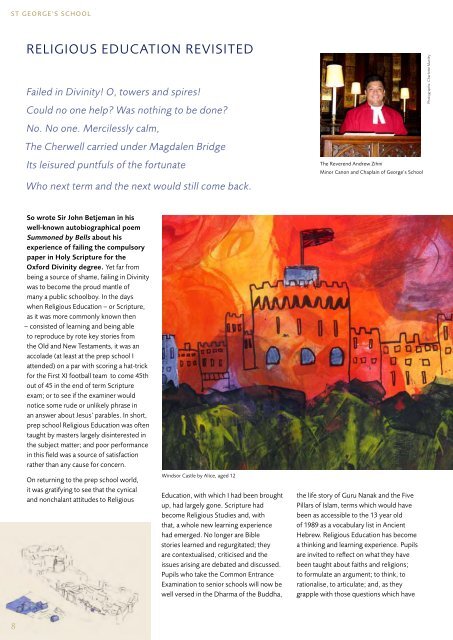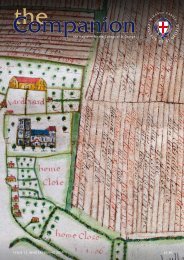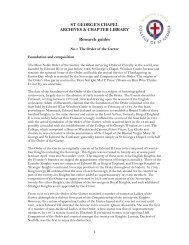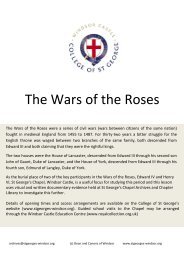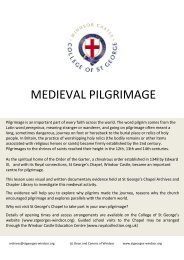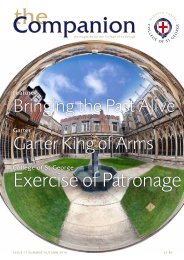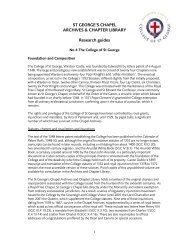Companion
The Music of St George's - St. George's Chapel, Windsor Castle
The Music of St George's - St. George's Chapel, Windsor Castle
- No tags were found...
Create successful ePaper yourself
Turn your PDF publications into a flip-book with our unique Google optimized e-Paper software.
ST GEORGE’S SCHOOL<br />
RELIGIOUS EDUCATION REVISITED<br />
Failed in Divinity! O, towers and spires!<br />
Could no one help? Was nothing to be done?<br />
Photographs: Charlotte Manley<br />
No. No one. Mercilessly calm,<br />
The Cherwell carried under Magdalen Bridge<br />
Its leisured puntfuls of the fortunate<br />
Who next term and the next would still come back.<br />
The Reverend Andrew Zihni<br />
Minor Canon and Chaplain of George’s School<br />
So wrote Sir John Betjeman in his<br />
well-known autobiographical poem<br />
Summoned by Bells about his<br />
experience of failing the compulsory<br />
paper in Holy Scripture for the<br />
Oxford Divinity degree. Yet far from<br />
being a source of shame, failing in Divinity<br />
was to become the proud mantle of<br />
many a public schoolboy. In the days<br />
when Religious Education – or Scripture,<br />
as it was more commonly known then<br />
– consisted of learning and being able<br />
to reproduce by rote key stories from<br />
the Old and New Testaments, it was an<br />
accolade (at least at the prep school I<br />
attended) on a par with scoring a hat-trick<br />
for the First XI football team to come 45th<br />
out of 45 in the end of term Scripture<br />
exam; or to see if the examiner would<br />
notice some rude or unlikely phrase in<br />
an answer about Jesus’ parables. In short,<br />
prep school Religious Education was often<br />
taught by masters largely disinterested in<br />
the subject matter; and poor performance<br />
in this field was a source of satisfaction<br />
rather than any cause for concern.<br />
On returning to the prep school world,<br />
it was gratifying to see that the cynical<br />
and nonchalant attitudes to Religious<br />
Windsor Castle by Alice, aged 12<br />
Education, with which I had been brought<br />
up, had largely gone. Scripture had<br />
become Religious Studies and, with<br />
that, a whole new learning experience<br />
had emerged. No longer are Bible<br />
stories learned and regurgitated; they<br />
are contextualised, criticised and the<br />
issues arising are debated and discussed.<br />
Pupils who take the Common Entrance<br />
Examination to senior schools will now be<br />
well versed in the Dharma of the Buddha,<br />
the life story of Guru Nanak and the Five<br />
Pillars of Islam, terms which would have<br />
been as accessible to the 13 year old<br />
of 1989 as a vocabulary list in Ancient<br />
Hebrew. Religious Education has become<br />
a thinking and learning experience. Pupils<br />
are invited to reflect on what they have<br />
been taught about faiths and religions;<br />
to formulate an argument; to think, to<br />
rationalise, to articulate; and, as they<br />
grapple with those questions which have<br />
8


